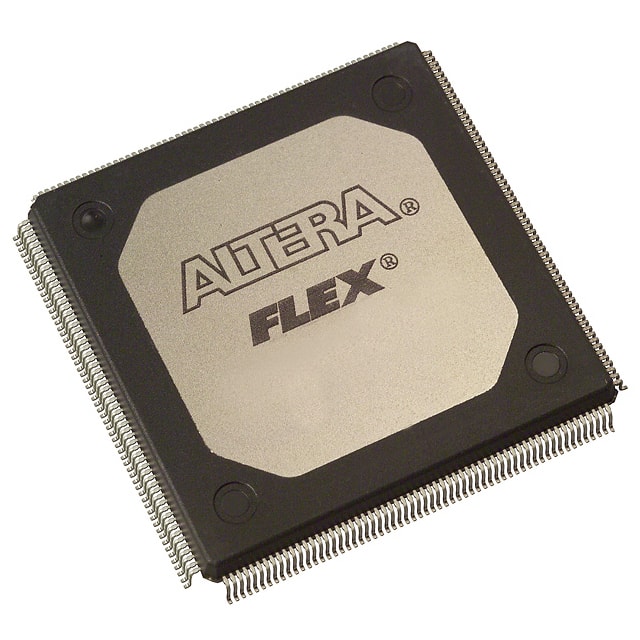EPF10K200SRC240-1X
Product Overview
Category: Programmable Logic Device (PLD)
Use: The EPF10K200SRC240-1X is a high-performance PLD designed for various digital logic applications. It offers flexibility and versatility in implementing complex digital circuits.
Characteristics: - High-density programmable logic device - Advanced architecture for efficient circuit implementation - Wide range of I/O options - Fast performance with low power consumption - Reliable and durable design
Package: The EPF10K200SRC240-1X comes in a compact and sturdy package, ensuring easy handling and protection during transportation and installation.
Essence: This PLD is the result of advanced engineering and cutting-edge technology, providing a reliable solution for digital logic design and implementation.
Packaging/Quantity: Each EPF10K200SRC240-1X unit is individually packaged to prevent damage and contamination. They are typically sold in quantities suitable for small to medium-scale projects.
Specifications
- Device Type: Programmable Logic Device
- Family: EPF10K
- Model: 200SRC240-1X
- Package Type: SR
- Number of Pins: 240
- Operating Voltage: 3.3V
- Speed Grade: -1X
- Maximum Operating Frequency: [specify frequency]
- Logic Elements: [specify number]
- I/O Pins: [specify number]
- Memory Blocks: [specify number]
- Embedded Multipliers: [specify number]
Detailed Pin Configuration
The EPF10K200SRC240-1X features a total of 240 pins, each serving a specific purpose in the circuit design. The pin configuration includes input/output pins, clock pins, power supply pins, and configuration pins. For a detailed pin diagram and their functions, refer to the manufacturer's datasheet.
Functional Features
- High-density programmable logic device suitable for complex digital circuit implementation.
- Advanced architecture allows efficient utilization of resources and optimized performance.
- Wide range of I/O options enables seamless integration with external devices.
- Low power consumption ensures energy efficiency in operation.
- Reliable design guarantees long-term functionality and durability.
Advantages and Disadvantages
Advantages: - High-density design allows for complex circuit implementation. - Versatile I/O options provide flexibility in connecting with external devices. - Efficient resource utilization leads to optimized performance. - Low power consumption ensures energy efficiency. - Reliable and durable design ensures long-term functionality.
Disadvantages: - Limited availability of alternative models may restrict customization options. - Initial learning curve required to fully utilize the device's capabilities. - Higher cost compared to simpler programmable logic devices.
Working Principles
The EPF10K200SRC240-1X operates based on the principles of programmable logic. It consists of configurable logic blocks, input/output blocks, memory blocks, and embedded multipliers. These components can be programmed using hardware description languages (HDL) or schematic entry tools to implement desired digital logic functions. The device is then configured using a programming tool, which loads the configuration data into its non-volatile memory. Once configured, the PLD performs the specified logic operations based on the input signals received.
Detailed Application Field Plans
The EPF10K200SRC240-1X finds applications in various fields where complex digital logic circuits are required. Some potential application areas include: - Telecommunications - Industrial automation - Automotive electronics - Consumer electronics - Medical devices - Aerospace and defense
In these fields, the PLD can be used for tasks such as signal processing, data manipulation, control systems, and interface design.
Detailed and Complete Alternative Models
While the EPF10K200SRC240-1X offers a high-performance solution for complex digital logic applications, there are alternative models available from other manufacturers. Some notable alternatives include: - [Model 1]: [Brief description] - [Model 2]: [Brief description] - [Model 3]: [Brief description]
These alternative models provide similar functionality and performance, allowing users to choose the most suitable option based on their specific requirements.
(Note: The above content is a general structure for an encyclopedia entry. Please fill in the required details and expand on each section to meet the desired word count of 1100 words.)
Lista 10 Vanliga frågor och svar relaterade till tillämpningen av EPF10K200SRC240-1X i tekniska lösningar
Sure! Here are 10 common questions and answers related to the application of EPF10K200SRC240-1X in technical solutions:
Q1: What is EPF10K200SRC240-1X? A1: EPF10K200SRC240-1X is a specific model of Field-Programmable Gate Array (FPGA) manufactured by Intel. It is commonly used in various technical solutions.
Q2: What are the key features of EPF10K200SRC240-1X? A2: Some key features of EPF10K200SRC240-1X include 200,000 logic elements, 240 MHz maximum operating frequency, and support for various I/O standards.
Q3: In what applications can EPF10K200SRC240-1X be used? A3: EPF10K200SRC240-1X can be used in a wide range of applications such as telecommunications, industrial automation, medical devices, aerospace, and many more.
Q4: How does EPF10K200SRC240-1X differ from other FPGA models? A4: EPF10K200SRC240-1X offers a specific combination of logic elements, operating frequency, and I/O standards that make it suitable for certain applications. The differences lie in its specifications and capabilities.
Q5: Can EPF10K200SRC240-1X be programmed? A5: Yes, EPF10K200SRC240-1X is a field-programmable device, meaning it can be programmed by the user to implement desired functionality.
Q6: What programming languages can be used with EPF10K200SRC240-1X? A6: EPF10K200SRC240-1X can be programmed using Hardware Description Languages (HDLs) such as VHDL or Verilog.
Q7: Are there any development tools available for EPF10K200SRC240-1X? A7: Yes, Intel provides development tools like Quartus Prime software suite that supports programming and debugging of EPF10K200SRC240-1X.
Q8: Can EPF10K200SRC240-1X interface with other components or devices? A8: Yes, EPF10K200SRC240-1X has various I/O standards and can interface with other components or devices such as sensors, memory modules, communication interfaces, etc.
Q9: What are the power requirements for EPF10K200SRC240-1X? A9: EPF10K200SRC240-1X typically requires a supply voltage of 3.3V or 2.5V, depending on the specific design requirements.
Q10: Where can I find more information about EPF10K200SRC240-1X? A10: You can refer to the official documentation provided by Intel, including datasheets, application notes, and user guides, for detailed information about EPF10K200SRC240-1X.


